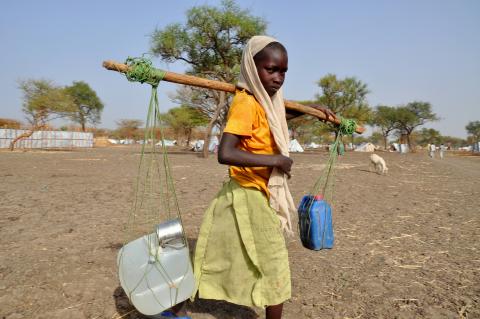
Driven by the need to further understand what works and what does not in the provision of water supply and sanitation services in Africa, the Independent Development Evaluation (IDEV) of the African Development Bank Group (AfDB) has released a new report highlighting some critical lessons and recommendations meant to improve future interventions and operations in the water and sanitation sector. Designed essentially as a learning and knowledge product, this report is mostly targeted at the development actors and practitioners involved in the sector.
Of the estimated 768 million people without sources of improved drinking water globally, 344 million people live in Africa. Similarly, of an estimated 2.5 billon people living without improved sanitation facilities in the world, 612 million live in Africa. For decades, the AfDB and other development partners have made this a central priority. The AfDB financed its first water sanitation operation in 1968. Since then it has gone ahead to approve 360 loans and grants in the Water Supply and Sanitation (WSS) sector, which represents approximately UA5 billion (USD7 billion) or 7% of all loans and grants approved by sector and amounts (2013).
But how well has the AfDB done in the provision of these vital services? The report concludes that “interventions undertaken by Regional Member Countries (RMCs) with support from the Bank and other development partners have improved access to water supply and sanitation in Africa overall, but the disparities between countries and projects, in some cases, are significant.”
This report which is the result of a desk review of evaluation reports of eighteen AfDB-funded water supply and sanitation (WSS) projects, completed between 2010 and 2012 and of the evaluation results of other MDBs as well as practical knowledge from 10 RMCs’ WSS Experts which shared experience during a regional workshop organized by AfDB in Morocco in 2013. The report further analyzed factors contributing to the success or failure of Water Supply and Sanitation (WSS) projects.
Quality at Entry Matters… so Does Project design
For successful projects, the report finds a strong correlation between project outcomes and quality of design. “Achieving project outcomes is strongly affected by the quality of the project design. Getting it right from the beginning strengthened implementation whereas sub-optimal design and quality at entry (QAE) often resulted in additional complications and project inefficiency,” says the report.
Appropriate Institutional Frameworks and Reform
The report states that “Institutional frameworks and reforms are fundamental for empowering institutions and ensuring achievement and sustenance of project objectives.” “In some projects where performance was rated satisfactory, institutional reform was associated with decentralization and the creation of entities with clear mandates and responsibilities. Most national water companies tended to be supported by local (semi-private) enterprises that were fully responsible for operations (technical and commercial services) and financial management (fundraising, contracts, investments).”
Stakeholder Coordination is Paramount
For the most part, projects involving the provision of water and sanitation in rural and urban communities involve many stakeholders. The report argues that “in some projects with satisfactory performance, the Bank promoted an integrated approach by establishing priorities among different ministries and sectors to overcome weak institutional coordination and to stimulate the governments to adopt a coordinated multi-program approach.”
War, politics, and policy
“Political stability has heavily influenced progress in improving access to water supply and sanitation in Africa,” concludes the report. Stable low-income countries, the report found, outperformed fragile and resource-rich low-income countries.“For some projects that registered unsatisfactory performance, the effect of war on the nation’s human and institutional capacities constrained project design and implementation and consequently contributed to the underachievement of the WSS objective.”
The 64 page report further analyzes how elements such as (a) slow institutional reforms, (b) operational inefficiency and non-financial profitability of WSS projects, (c) weak technical capacities, (d) poor adherence to timelines, and (e) weak M&E systems could result to unsatisfactory performance of WSS projects.
- Contact Task Manager: Joseph Mouanda (Senior Evaluation Officer), Email: j.mouanda@afdb.org, Tel: +225 2026 3679

